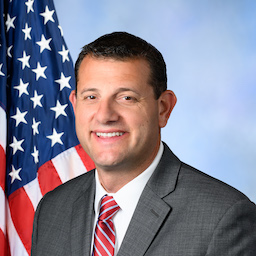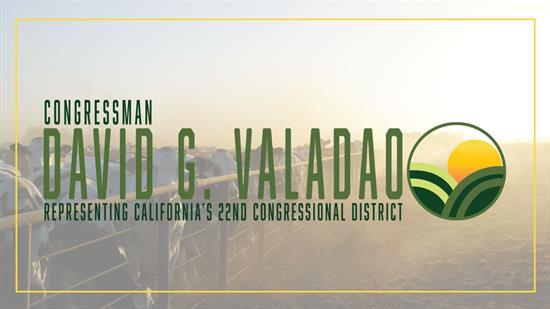- Home
- About
-
Services
- Art Competition
- Community Project Funding Map
- Congressional App Contest
- Congressional Certificate
- Event Request
- Flag Request
- Grants
- Grant Letters of Support
- Help with a Federal Agency
- Inauguration
- Internships
- Kids Page
- Meeting Request
- Service Academy Nominations
- Tour Requests
- Vietnam Veteran Commemoration
- Government Shutdown FAQ
- Issues
- Media
- Contact

Press Releases
Congressman Valadao Joins Bipartisan Bill to Support Drought Resilient Agricultural Practices
Washington,
November 15, 2023
|
Faith Mabry
Tags:
Water
Congressman David G. Valadao (CA-22) recently joined Reps. Teresa Leger Fernández (NM-03) and Chellie Pingree (ME-01) to introduce H.R. 5764, the Support Water-Efficient Strategies and Technologies (WEST) Act to support agriculture practices more commonly used in Western climates.
WASHINGTON – Congressman David G. Valadao (CA-22) recently joined Reps. Teresa Leger Fernández (NM-03) and Chellie Pingree (ME-01) to introduce H.R. 5764, the Support Water-Efficient Strategies and Technologies (WEST) Act to support agriculture practices more commonly used in Western climates. “Our farmers and producers in the Central Valley supply a quarter of our nation’s food and the majority of our nation’s fruits, nuts and vegetables,” said Congressman Valadao. “Nearly all of our farmers in California have learned how to navigate drought conditions and unfair water allocations, and they know better than anyone how to conserve water and grow drought-resilient crops. The WEST Act would support the agriculture practices more commonly used in dry areas so that our farmers have the resources they need to continue growing the food that feeds the nation.” “For generations, farmers and ranchers in New Mexico have been conserving water and growing drought-resilient crops in arid climates. Their crops feed our families and are distributed across America’s tables,” said Congresswoman Leger Fernández. “However, we learned during our ‘Farm-to-Congress’ conversations that USDA conservation programs are sometimes targeted for wetter conditions found in the East and Midwest. This bill will help these essential programs work better for Western farmers and ranchers. I thank Congressman Valadao and Congresswoman Pingree for joining me in introducing the Support the WEST Act to support programs that help retain and conserve water. Our ranch and farming communities in the West deserve the same opportunities as those in other parts of our beautiful country. I am committed to getting this in the Farm Bill and across the finish line.”
|

